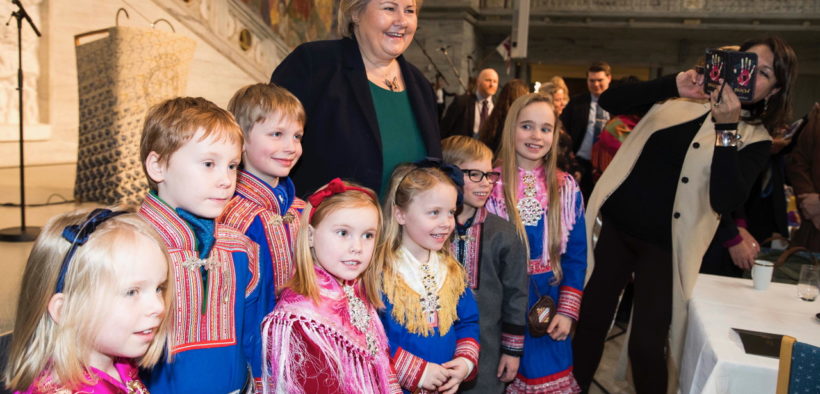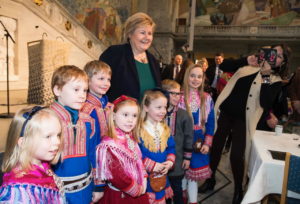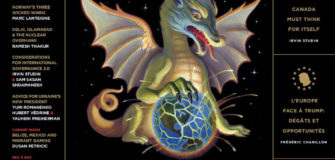European Troubles and Norway’s Three-Point Game

 Russia, the Arctic, Brexit and Europe’s larger pressures are beginning to stress the Scandinavian nation’s serenity
Russia, the Arctic, Brexit and Europe’s larger pressures are beginning to stress the Scandinavian nation’s serenity
Norway today has the dubious honour of being, at least for now, a centre of reasonable calm at the intersection of three of the world’s major debates involving Europe: the Russian question, the rapid opening up of the Arctic, and the political trauma within the EU itself, of which Norway is not a formal part. Each of these debates has the potential to greatly influence Norwegian politics and global relations – not least by challenging the long-held perception of Oslo being ‘above the fray’ in respect of greater European affairs.
The Russian Question
The current Norwegian relationship with Russia suggests two narratives – one driven by northern Norway, and the other by southern Norway. The ‘southern’ (central government) narrative focusses on Norway’s ongoing role within NATO and concerns about potential Russian military expansionism in the Arctic and North Atlantic. Even before the Crimean annexation and the start of the Donbass conflict in 2014, there were signs that Oslo was beginning to take a more pragmatic approach to Russian relations, given Russia’s growing military and political strength and the cooling of relations between Moscow and several Western capitals, including Washington. More recently, increased NATO visibility in the Arctic and North Atlantic has only served to further irritate the Kremlin, with Norway caught squarely in the middle.
The agreement by Oslo in mid-2018 to host larger numbers of US Marines – potentially as many as 700 in 2019 – factored into further Russian criticism to the effect that Norway was becoming a proxy actor for American strategic interests in Northern Europe. Moreover, in September and October of that same year, Norway hosted one of the largest NATO military manoeuvres – Trident Junction – held since the very creation of the alliance. That exercise also included extensive participation by two non-NATO states, Finland and Sweden – in the event, right at Russia’s northwestern frontier.
To be sure, the Norwegian government of Erna Solberg has been careful not to define Moscow explicitly as a regional threat. Her comments at the International Arctic Forum in St. Petersburg this past April made plain her view that Russia was in fact not a threat to Norwegian interests. Having said this, in a broader sense, Norway’s relations with NATO are affected, on the one hand, by indications of growing Russian military activity and activism in the Nordic Arctic region, and on the other by the tenuous relationship between the Trump administration and NATO members in Europe.
As for the ‘northern narrative,’ Moscow is indeed perceived differently as between Oslo and the Norwegian counties closest to the Russian border, (Finnmark, Nordland and Troms, which make up the country’s Nord-Norge region). Part of this perception can be attributed to lingering appreciation of the actions of the Soviet Union in liberating Finnmark, Norway’s northernmost region, from Nazi Germany in WW2. Indeed, despite the current state of Russian-Norwegian relations, Russia’s foreign minister, Sergei Lavrov, has been invited to the border town of Kirkenes to commemorate the 75th anniversary of the start of the Red Army’s campaign to push German forces out of Finnmark in October 1944. Of course, there is also the socio-economic closeness of the Norwegian and Russian communities along the border within the Barents Sea sub-region, which includes the northern regions of Finland and Norway, as well as Russia’s northwestern Kola Peninsula and areas around the cities of Arkhangelsk and Murmansk.
Still, all has not been completely quiet on the Norwegian-Russian border, as underlined by recent incidents, including accusations by Oslo that Russia interfered with GPS systems in northern Norway during the 2018 NATO simulations, and a mock attack this past February by Russian Sukhoi-24 jets on Norwegian radar installations in Vardo.
The Arctic Question
Separating concerns about Russia from greater Arctic affairs has been difficult for Norway, and for any Western government for that matter, given Russia’s historic strengths in the region. As the Arctic becomes a key new-century theatre for economic activities, including in shipping and the extractive industries, Norway is trying to catch up with fast-moving dynamics in the circumpolar north. In its most recent Arctic policy paper, published in 2017, Oslo stressed the importance of international cooperation – including in economic affairs – in the region. It also noted the impending challenge posed by the growing number of non-Arctic actors seeking to develop a greater presence in the far north. At the top of this list is, to be sure, China, which has over the past decade advanced a series of economic and scientific strategies designed to better integrate itself into Arctic affairs, despite having no territory anywhere near the Arctic Ocean itself.
Oslo’s relations with Beijing are still recovering from a difficult six-year diplomatic freeze over the awarding of the 2010 Nobel Peace Prize to the Chinese writer and activist Liu Xiaobo. The Arctic remained one of the few areas where any high-level dialogue between the two governments could still take place. Now with full diplomatic relations restored, Arctic affairs remain a major facet of Sino-Norwegian relations – in some cases an area of contention, as demonstrated by recent bilateral differences in respect of the kinds of research that Chinese and other foreign players should be permitted to undertake in the Norwegian Arctic islands of Svalbard.
Now with full diplomatic relations restored, Arctic affairs remain a major facet of Sino-Norwegian relations – in some cases an area of contention, as demonstrated by recent bilateral differences in respect of the kinds of research that Chinese and other foreign players should be permitted to undertake in the Norwegian Arctic islands of Svalbard.
China’s Belt and Road Initiative (BRI) has also now begun to enter the Arctic region, with energy partnerships having been signed with Russia, increased Chinese interest in Arctic shipping, and warmer Chinese economic relations with Iceland and Finland (although Sino-Canadian relations are at a historic low). Norway must soon decide how closely it wishes to align itself vis-à-vis the BRI push, especially as more of its European neighbours, including recent joiners like Italy and Switzerland, sign on.
Norway is also being viewed as a potential transit point for future Arctic shipping along the Northern Sea Route, which stretches from the Russian Far East through to Europe and the North American frontier. Indeed, Norway is facing ongoing questions about the development of service and transportation infrastructure – including rail links and expanded port facilities in its northern regions. This is all happening just as Oslo is seeking to establish and brand the country as a knowledge base for Arctic research, as evidenced by the annual Arctic Frontiers conference in Tromso which, along with its younger and brasher sibling, Reykjavík’s Arctic Circle forum, represent two of the most important ‘track 2’ conferences bringing together regional specialists from academic, journalism, policy and scientific circles to discuss and debate current Arctic issues.
Finally, despite much of the Norwegian economy, as well as the country’s sovereign wealth fund (currently valued at nine trillion kroner, or US$1.05 trillion), being based on offshore oil drilling – including in Arctic waters – the Norwegian government appears poised to significantly scale back fossil fuel extraction in the Arctic. The country’s largest opposition party, Labour, has just called for a halt to any and all plans for oil exploration around the Lofoten archipelago, despite it containing an estimated one to three billion barrels of untapped oil. In March of this year, it was announced that the sovereign wealth fund would itself be divesting from numerous oil and gas firms. The fund subsequently committed to increasing investment in renewable energy concerns as part of a concerted push toward green policies. Grosso modo, despite ongoing speculation about potential races for Arctic fossil fuels as the theatre continues to warm and the sea-ice and permafrost melt, Norway appears set to move in a different direction, which would significantly affect the shape of its economy and its relations with other Arctic states.
Brexit and the Larger European Question
Within Europe itself, Norway, like almost all other governments, is watching the Brexit process in London with considerable trepidation as the UK continues to stumble along with no clear outcome, and with the possibility of a ‘no-deal’ scenario, under a new prime minister and a pro-Brexit British alignment in the newly elected European Parliament, that may result in that country leaving the EU without any blueprint for European economic relations. Multiple options have been floated over the past year as to how Britain could successfully withdraw and still retain certain benefits from its erstwhile membership – including a so-called ‘Norway option’ that more or less mirrors Oslo’s distinct relations with the EU. Although not an EU member, Norway does have membership in the European Economic Area (EEA), and is very much part of the EU’s Schengen area, which allows for freedom of movement between member states.
Norway is also, along with Iceland, Liechtenstein and Switzerland, a member of the European Free Trade Association (EFTA), which gives it access to the European Single Market. However, the hypothetical Norway model involves considerable national fiscal alignment with EU rules without proper representation in the Union, and current British views on immigration would appear to preclude an open border policy similar to that of Norway. Although there have been suggestions that the UK could rejoin the EFTA (which the UK originally left in 1973 to instead become a member of the then-European Economic Community), some Norwegian policy-makers have been decidedly cool to the idea, with one Conservative Party member, Heidi Nordby Lunde, bluntly commenting in December of last year that the EFTA should not be Britain’s ‘rebound partner.’
Anticipating the strong possibility of a no-deal Brexit, Oslo agreed to sign a revised trade agreement with the UK in March of this year – an agreement that included sections on natural gas and seafood. Still, should the UK leave the EU in 2019, under whatever format, Norway will need to readjust its European policies to account for a new country outside of the immediate EU system.
Each of these three present-day European challenges – Russia, the Arctic, and the EU face-à-face with Brexit and a polarized politics – has clearly placed Norway in a difficult position. And together, they suggest some potentially wicked strategic winds around the bend for Oslo. At the same time, there will – to be sure – be opportunities for Oslo to act very deliberately and purposefully as a voice of restraint, reason and pragmatism on a continent in which the political and ideological centre is increasingly being crowded out. The upcoming Finnmark liberation anniversary may allow for at least a low-level dialogue between Oslo and Moscow, just as Norway balances engagement with the Kremlin against ongoing coordination with NATO and other multilateral fora to discourage the further militarisation of the Arctic. The new Icelandic chairmanship of the Arctic Council may also supply Oslo with openings for regional policy coordination in the context of this fine balance.
Looking further south, Oslo’s long history of being ‘next to the EU, but not within it’ will continue to provide the UK, despite its growing internal political disarray, with moderate reference points, if not a specific model for EU engagement, as London seeks to engage the EFTA more directly – and assuming that the Brexit process is not somehow reversed. Of course, Oslo’s planners cannot rule such a reversal out either.
Marc Lanteigne is Associate Professor of Political Science at the University of Tromso, The Arctic University of Norway.











